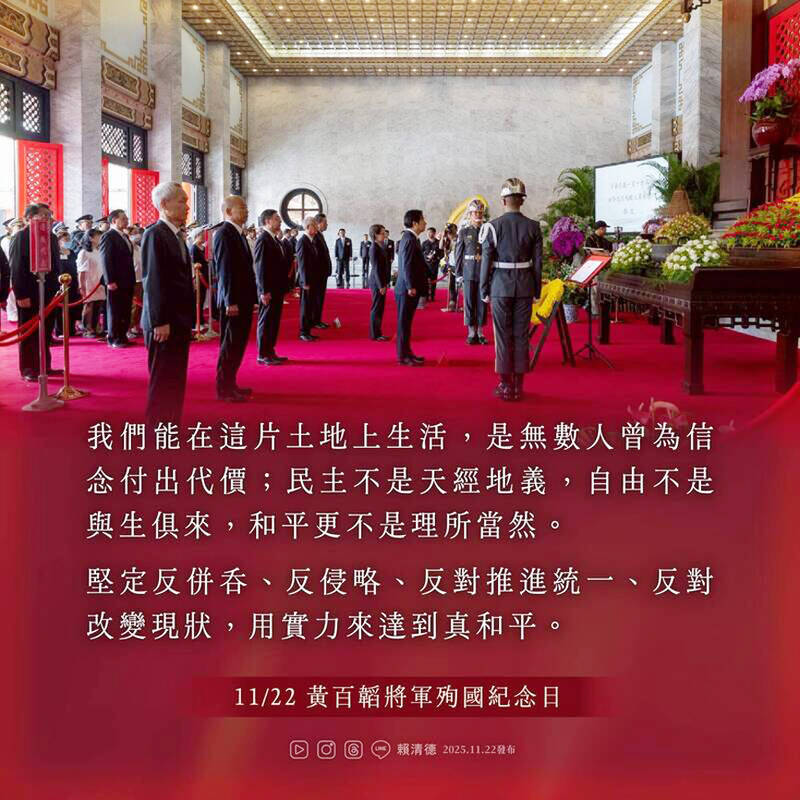The people we should remember are the soldiers of the Armed Forces, not communist spies, President William Lai (賴清德) wrote on Facebook yesterday, in an apparent reference to Chinese Nationalist Party (KMT) Chairwoman Cheng Li-wun (鄭麗文) attending an event honoring people killed during the White Terror era, including Chinese spy Wu Shi (吳石).
Lai was paying tribute to general Huang Bai-tao (黃百韜), who died during the Huaihai Campaign (淮海戰役) at the age of 49.
“Today is the memorial day of General Huang Bai-tao’s sacrifice for the country. As the Commander-in-Chief of the Republic of China’s Armed Forces, I would like to pay the highest respect to him and to all the martyrs who sacrificed their lives for the country,” Lai wrote.

Photo: Screen grab from President Lai’s Facebook page
In the National Defense University and the Army Officer Academy, there is a building named “Baitao Hall” in honor of Huang, he said.
Huang spent his life in the military and was known for defeating enemies despite having fewer troops, successfully repelling the Chinese communist forces on several occasions, Lai said.
At that time, the KMT had already been infiltrated by communist spies, such as Wu and Guo Rugui (郭汝瑰), who leaked important operational information to the enemy, he said, adding that as a result, about 555,000 Nationalist Army troops’ lives were lost during the 66 days of the Huaihai Campaign.
During the intense offensive and defensive battles of the campaign, and as they were running out of ammunition and supplies, Huang displayed the true spirit of a soldier, choosing to defend his beliefs with his life, the president said.
“The loyalty, courage and sense of duty he exhibited serve is a profound reminder to Taiwan,” he said.
Looking back on this period of war urges us to reflect on the many patriotic heroes who gave their lives to resist communist authoritarianism, Lai said, adding that it also serves as a lesson to be vigilant about the infiltration and influence of authoritarian forces.

ALIGNED THINKING: Taiwan and Japan have a mutual interest in trade, culture and engineering, and can work together for stability, Cho Jung-tai said Taiwan and Japan are two like-minded countries willing to work together to form a “safety barrier” in the Indo-Pacific region, Premier Cho Jung-tai (卓榮泰) yesterday said at the opening ceremony of the 35th Taiwan-Japan Modern Engineering and Technology Symposium in Taipei. Taiwan and Japan are close geographically and closer emotionally, he added. Citing the overflowing of a barrier lake in the Mataian River (馬太鞍溪) in September, Cho said the submersible water level sensors given by Japan during the disaster helped Taiwan monitor the lake’s water levels more accurately. Japan also provided a lot of vaccines early in the outbreak of the COVID-19 pandemic,

Kaohsiung Mayor Chen Chi-mai (陳其邁) on Monday announced light shows and themed traffic lights to welcome fans of South Korean pop group Twice to the port city. The group is to play Kaohsiung on Saturday as part of its “This Is For” world tour. It would be the group’s first performance in Taiwan since its debut 10 years ago. The all-female group consists of five South Koreans, three Japanese and Tainan’s Chou Tzu-yu (周子瑜), the first Taiwan-born and raised member of a South Korean girl group. To promote the group’s arrival, the city has been holding a series of events, including a pop-up

The Ministry of Foreign Affairs (MOFA) yesterday voiced dissatisfaction with the Comprehensive and Progressive Agreement for Trans- Pacific Partnership (CPTPP), whose latest meeting, concluded earlier the same day, appeared not to address the country’s application. In a statement, MOFA said the CPTPP commission had "once again failed to fairly process Taiwan’s application," attributing the inaction to the bloc’s "succumbing to political pressure," without elaborating. Taiwan submitted its CPTPP application under the name "Separate Customs Territory of Taiwan, Penghu, Kinmen and Matsu" on Sept. 22, 2021 -- less than a week after China

TEMPORAL/SPIRITUAL: Beijing’s claim that the next Buddhist leader must come from China is a heavy-handed political maneuver that will fall flat-faced, experts said China’s requirement that the Dalai Lama’s reincarnation to be born in China and approved by Beijing has drawn criticism, with experts at a forum in Taipei yesterday saying that if Beijing were to put forth its own Dalai Lama, the person would not be recognized by the Tibetan Buddhist community. The experts made a remarks at the two-day forum hosted by the Tibet Religious Foundation of His Holiness the Dalai Lama titled: “The Snow Land Forum: Finding Common Ground on Tibet.” China says it has the right to determine the Dalai Lama’s reincarnation, as it claims sovereignty over Tibet since ancient times,